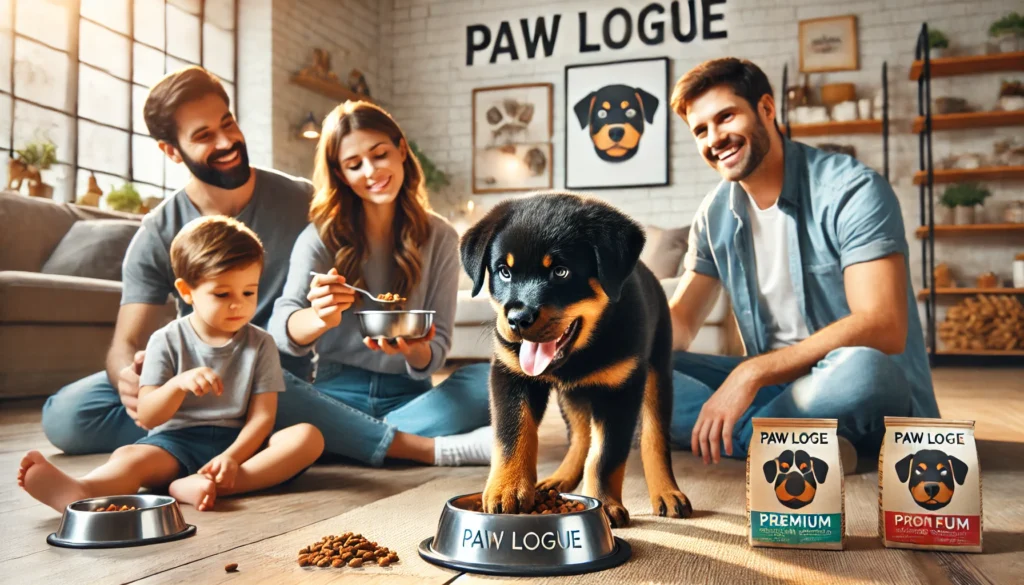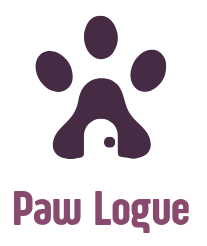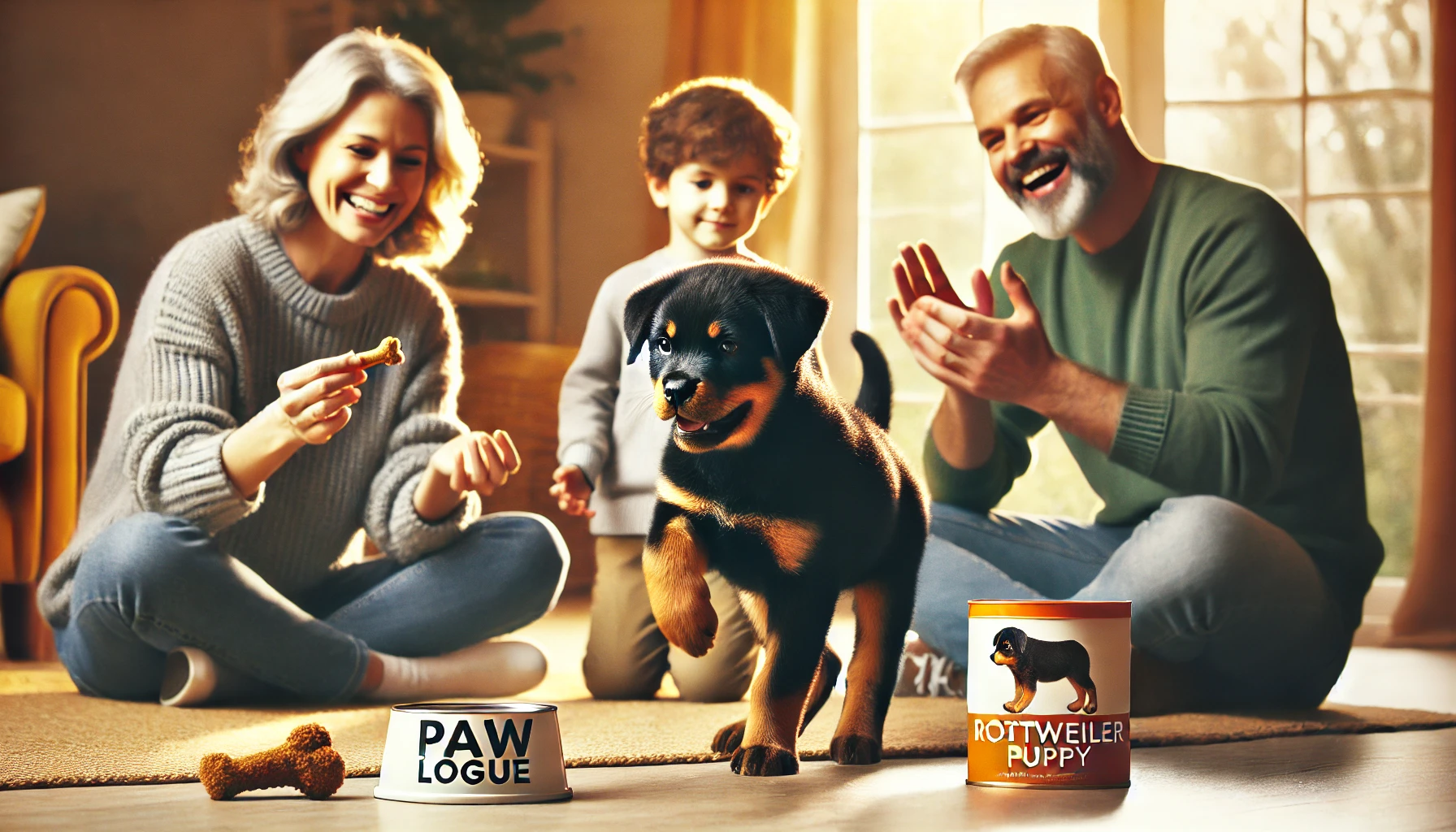Raising a Rottweiler puppy comes with an important set of responsibilities, and one of the most crucial aspects is ensuring your puppy receives the right nutrition. Just like humans, dogs require a diet tailored to their unique needs, especially during their early growth stages. Rottweiler puppies grow rapidly and develop into strong, muscular adults, so feeding them a balanced diet is vital for their overall health, development, and longevity.
In this blog, we’ll break down the essential components of a Rottweiler puppy’s diet, drawing from real-world experiences and backed by case studies and expert recommendations. We’ll cover everything from key nutritional requirements to choosing premium dog foods, and also address common feeding mistakes. By the end, you’ll have all the knowledge you need to help your Rottweiler puppy grow into a healthy adult.
Check out other Puppy Diets

Understanding Your Rottweiler Puppy’s Nutritional Needs
When it comes to feeding your Rottweiler puppy, the primary goal is to support their rapid growth without overfeeding, which could lead to obesity or skeletal problems. This breed is known for its muscular build, strong bones, and high energy levels, which means their diet should be rich in protein, calcium, and healthy fats.
Protein: The Building Block of Growth
Protein is essential for all puppies, but it’s especially important for Rottweilers because of their muscle mass. Your puppy’s food should contain high-quality animal proteins, such as chicken, beef, lamb, or fish. Protein supports muscle development, tissue repair, and the overall growth of your puppy.
Case studies have shown that puppies fed a diet with at least 22-25% protein grow at a healthy, steady rate. For example, a study conducted by the American Kennel Club (AKC) compared the growth rates of Rottweiler puppies fed with high-protein diets versus lower-protein diets. Puppies that received sufficient protein showed optimal muscle development without any signs of muscle weakness or fatigue, while those on lower-protein diets lagged in muscle growth and had less energy.
Calcium and Phosphorus: Supporting Bone Health
Rottweilers are prone to joint issues like hip dysplasia, especially if their bones grow too quickly or are improperly supported by their diet. This is where calcium and phosphorus play a crucial role. These minerals are necessary for proper bone formation and strength.
For puppies, a proper balance of calcium and phosphorus is important—too much calcium can cause abnormal bone growth, while too little can result in weak, brittle bones. The ideal ratio is 1:1 to 2:1 calcium to phosphorus. According to veterinary research, Rottweiler puppies should have diets containing at least 1.2-1.5% calcium to ensure optimal bone development. Premium puppy foods often highlight their calcium and phosphorus ratios, making it easier to ensure your dog is receiving the right amounts.
Healthy Fats: Energy and Coat Health
Fats are a great source of energy for Rottweiler puppies, and they also help maintain a healthy coat and skin. The fatty acids omega-3 and omega-6 are especially beneficial. These fats support the immune system, enhance brain function, and keep your puppy’s coat shiny and soft.
The National Research Council suggests that a puppy’s diet should contain around 8-12% fat. However, Rottweilers should not be overfed fatty foods as they are susceptible to weight gain. Always ensure that fats are sourced from high-quality ingredients, like fish oils or flaxseed.
Feeding Schedule and Portions: Getting It Right
Many new Rottweiler owners wonder how much and how often to feed their puppy. A structured feeding schedule ensures your puppy gets consistent energy throughout the day and helps prevent overeating. In general, puppies should be fed three to four times per day until they reach six months of age. After six months, you can gradually reduce this to two meals per day.
Portion Control and Overfeeding
Overfeeding is a common issue, especially with larger breeds like Rottweilers. Puppies are often eager eaters, and it’s easy to misjudge the correct portion size. Feeding your puppy too much can lead to rapid growth, putting strain on their developing bones and joints, as well as increasing the risk of obesity.
To avoid overfeeding, follow the guidelines provided by your puppy food’s manufacturer, but adjust based on your puppy’s specific needs. You should regularly monitor their weight and body condition. Veterinarians recommend that puppies should have a visible waistline when viewed from above and a slightly tucked abdomen when viewed from the side.
A Real-World Example of Proper Feeding Portions
A case study conducted by a leading animal nutrition company tracked a group of Rottweiler puppies raised on different portion-controlled diets. The group that followed strict portion guidelines based on their age, size, and activity level maintained a healthier weight compared to the group that was allowed to free-feed (eat whenever they wanted). The portion-controlled puppies had fewer skeletal issues and demonstrated more stable growth.
By sticking to proper feeding portions and maintaining a consistent schedule, you’ll help your puppy develop at a healthy rate, avoiding unnecessary weight gain or joint strain.
Choosing the Right Food for Your Rottweiler Puppy
Now that you know what nutrients your puppy needs, let’s talk about selecting the best food to meet those needs. Rottweiler puppies benefit from high-quality, nutrient-dense foods, ideally formulated for large-breed puppies.
Premium Puppy Foods to Consider
- Royal Canin Rottweiler Puppy Formula: This food is specifically designed for Rottweiler puppies and provides balanced levels of protein, fat, and calcium to support healthy growth. It also includes glucosamine and chondroitin, which promote joint health, an essential consideration for Rottweilers.
- Blue Buffalo Life Protection Formula Puppy: This grain-free food features high-quality protein from deboned chicken, which helps support muscle development. It also contains DHA and ARA (important fatty acids) to promote cognitive function and vision.
- Orijen Puppy Large: This premium brand focuses on biologically appropriate diets and uses fresh, whole prey ingredients like free-range chicken, turkey, and wild-caught fish. Its high protein content supports the muscle-building needs of Rottweilers, and the balanced calcium-phosphorus ratio supports healthy bone development.
Comparing Dry vs. Wet Food
Both dry and wet foods have their benefits. Dry food (kibble) is typically more affordable, easier to store, and better for dental health as it helps clean teeth while chewing. Wet food, on the other hand, is more palatable and can be a good choice if your puppy is a picky eater or needs extra hydration.
In a study published by the Journal of Veterinary Internal Medicine, a group of Rottweiler puppies was observed on a kibble-based diet versus a wet-food diet. While both groups grew normally, the puppies on the kibble diet had better dental health, while the wet food group had more consistent hydration levels. Ultimately, a balanced combination of both dry and wet food can work well to provide variety in texture and taste, while ensuring your puppy gets all the nutrients they need.
Avoiding Common Feeding Mistakes
Feeding your Rottweiler puppy might seem straightforward, but there are some common mistakes that can hinder their growth and health. Let’s look at a few.
Feeding Table Scraps
It can be tempting to give your puppy a taste of human food from the table, but this can lead to bad habits and nutritional imbalances. Many human foods are not suitable for dogs and can cause digestive problems or even toxicity. For example, chocolate, grapes, onions, and garlic are all harmful to dogs.
In a survey of dog owners, it was found that those who frequently fed their puppies table scraps were more likely to have overweight dogs. These dogs also had a higher incidence of digestive issues like diarrhea and vomiting, which can be particularly dangerous for puppies.
Feeding Adult Dog Food Too Early
Rottweilers have specific nutritional needs during their puppy stage that differ from adult dogs. Adult dog food often contains lower protein and fat levels, which can be insufficient for a growing puppy. Transitioning to adult dog food should only happen once your puppy has reached at least 80-90% of their adult size, typically around 12 to 18 months.
Supplements: Are They Necessary?
While a well-balanced puppy food typically provides all the necessary nutrients, some Rottweiler owners choose to add supplements, particularly for joint health. Rottweilers are prone to hip and elbow dysplasia, so many breeders and veterinarians recommend supplementing with glucosamine and chondroitin.
However, it’s important not to over-supplement. Too much calcium, for instance, can lead to skeletal deformities. If you’re considering supplements, it’s best to consult with your veterinarian first to ensure they’re appropriate for your puppy’s individual needs.
Tracking Growth and Development
As a Rottweiler puppy grows, it’s important to track their weight and development. Rottweiler puppies typically gain 2 to 3 pounds per week during their early months. By six months, male puppies usually weigh between 64 and 71 pounds, while females weigh between 60 and 65 pounds. They will continue to grow and fill out until they reach about 18 to 24 months old.
Regular check-ups with your veterinarian can help monitor your puppy’s progress and catch any potential health concerns early. If your puppy’s growth rate seems abnormal—either too fast or too slow—it’s worth reevaluating their diet and discussing with your vet.
Final Thoughts
Feeding your Rottweiler puppy a balanced diet is one of the most important aspects of ensuring they grow up healthy and strong. By focusing on high-quality proteins, proper calcium and phosphorus ratios, and healthy fats, you can support your puppy’s rapid growth and muscular development. Be mindful of portion control to avoid overfeeding, and select premium dog foods that cater to large-breed puppies.
Remember, every Rottweiler is unique, so monitoring their progress, consulting with your vet, and being consistent with their diet will give them the best chance for a long and happy life. By starting with a solid nutritional foundation, you’re setting up your Rottweiler for a lifetime of health and vitality
Can Feeding the Wrong Diet Shorten My Rottweiler’s Lifespan?
Yes, feeding an improper diet can significantly impact your Rottweiler’s health and longevity. Poor nutrition can lead to obesity, joint problems, and even heart disease, all of which can reduce your dog’s lifespan. It’s crucial to feed a diet balanced for large-breed puppies to support their rapid growth and prevent long-term health issues.
What’s the One Common Food That Could Harm Your Rottweiler Puppy?
Grapes and raisins are particularly toxic to dogs, including Rottweiler puppies. Even small amounts can cause kidney failure. Other harmful foods include chocolate, onions, and garlic, so it’s vital to keep these away from your puppy’s diet.
Is Your Rottweiler Puppy Missing Out on This Critical Nutrient?
Many Rottweiler owners unknowingly miss out on providing sufficient omega-3 fatty acids, which are essential for healthy skin, coat, and brain development. Ensuring your puppy gets these fats, often found in fish oils or flaxseed, can boost overall health and cognitive function.
How Much Protein Is Too Much for a Growing Rottweiler?
While protein is critical for growth, excess protein (above 30-35%) may cause weight gain or stress the kidneys. For large breeds like Rottweilers, it’s best to aim for a diet with 22-25% protein. Too much protein may also cause rapid growth, which can lead to joint and bone issues.
Should You Feed Your Rottweiler Puppy Raw Meat for Better Muscle Growth?
Raw meat diets, also known as BARF (Biologically Appropriate Raw Food), are controversial. While some believe raw feeding can improve muscle growth and coat quality, raw meat can carry harmful bacteria like Salmonella and E. coli. If you decide to try a raw diet, consult your vet first to ensure it’s safe and balanced.
Is Your Puppy’s Diet Causing Joint Problems?
Feeding your puppy too many calories or an unbalanced diet, especially one with excessive calcium, can lead to joint issues like hip dysplasia. Watch for signs like limping or reluctance to run or jump, and always stick to a diet specially formulated for large-breed puppies to support healthy joints.
Does Your Rottweiler Puppy Need Supplements or Are You Wasting Money?
In most cases, if you’re feeding a high-quality, balanced puppy food, additional supplements aren’t necessary. However, if your puppy is prone to joint issues, supplements like glucosamine and chondroitin may be beneficial. Always consult your vet before adding any supplements to your puppy’s diet.
What Are the Hidden Dangers of Grain-Free Diets for Rottweiler Puppies?
Grain-free diets have been linked to heart problems, specifically dilated cardiomyopathy (DCM), in some dog breeds. While not all dogs are affected, some Rottweilers may benefit from diets containing grains, as they provide energy and fiber. Always discuss diet choices with your vet, especially if you’re considering grain-free options.
How Can You Tell If Your Puppy’s Diet Is Stunting Their Growth?
If your Rottweiler puppy isn’t gaining weight or growing as expected, it could indicate an inadequate diet. Look for slow growth, a lack of energy, or a dull coat. Regular vet check-ups can help monitor your puppy’s growth and ensure their diet is on track.
What’s the Secret Ingredient in Premium Dog Foods That Boosts Puppy Health?
Many premium dog foods include glucosamine and chondroitin, which help promote joint health—critical for large-breed dogs like Rottweilers. Additionally, DHA, an omega-3 fatty acid, is often included to support brain development and cognitive function. These ingredients make a significant difference in the overall health of a growing puppy.

